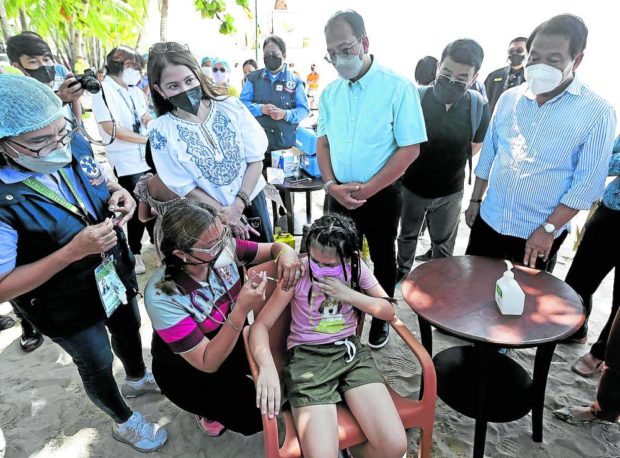51% of Filipinos believe COVID-19 crisis ending in 2022 — SWS survey

Tourism Secretary Bernadette Romulo Puyat and National Task Force Against COVID-19 chief implementer and vaccine czar Secretary Carlito Galvez Jr. (2nd and 3rd from left) oversee the vaccination of children age 5 to 11 in Boracay Island, Aklan on Friday. Boracay currently has no active COVID-19 case. (RICHARD A. REYES / INQUIRER)
MANILA, Philippines — More than half of Filipinos believe that the COVID-19 crisis will come to an end this year, while 45 percent still think it would extend to 2023, the latest survey from Social Weather Stations (SWS) showed on Friday.
According to the SWS survey, 51 percent of Filipino adults interviewed from December 12 to 16 said the crisis would end in 2022 — including 29 percent of the respondents who said that the pandemic would be solved in the next six months, and 23 percent who said within the year.
Hopes of having the COVID-19 pandemic ending within 2022 is highest in Mindanao at 62 percent, followed by Balance Luzon at 51 percent, Metro Manila at 49 percent and Visayas at 41 percent.
“Conversely, those who expect the COVID-19 crisis to end after 2022 are highest in the Visayas (56%), followed by Metro Manila (48%), Balance Luzon (44%), and Mindanao (35%),” SWS said.
“About half in all educational levels expect the COVID-19 crisis to end within 2022: the percentage is 49 percent among non-elementary graduates, 53 percent among elementary graduates, 51 percent among junior high school graduates, and 50 percent among college graduates,” it added.
Article continues after this advertisementWith other questions posed by SWS, 51 percent also agreed with the possible government policy of compelling Filipinos to get vaccinated against COVID-19, with 31 percent disagreeing while 17 percent were undecided.
Article continues after this advertisementAnother 51 percent also agreed to have unvaccinated employees submit RT-PCR tests every two weeks, with 35 percent disagreeing and 14 percent still undecided.
“To the test statement, ‘It is only right to enact into law the proposal of Pres. Duterte to compel all Filipinos to get vaccinated against COVID-19,’ 51% agreed (consisting of 29% strongly agree and 22% somewhat agree), 17% were undecided, and 31% disagreed (consisting of 13% somewhat disagree and 19% strongly disagree, correctly rounded),” SWS said.
“To the test statement, ‘It is only right that unvaccinated employees are not allowed to report for work until they give a negative RT-PCR test result every two weeks,’ 51% agreed (27% strongly agree, 24% somewhat agree), 14% were undecided, and 35% disagreed (15% somewhat disagree, 20% strongly disagree), for a moderate net agreement of +16,” it added.
In terms of no dine-in policies for unvaccinated customers, 49 percent agreed, 14 percent were undecided, and 36 percent disagreed.
The country encountered a surge in COVID-19 cases in early January, brought by the more infectious Omicron variant. At one point, active infections soared to over 291,000 — an all-time high for the country.
While the Omicron variant only led to mostly mild and asymptomatic symptoms for vaccinated individuals and lower mortality rates, health authorities are still wary about a possible increase in infections anew.
Recently, the Department of Health (DOH) expressed concern that the start of the campaign period last February 8 may lead to so-called super-spreader events, as health and safety protocols against the pandemic have been disregarded.
SWS said that they got the results through face-to-face interviews of 1,440 adults subdivided into 360 each for Balance Luzon, Metro Manila, Visayas, and Mindanao.
The polling firm maintains sampling error margins are ±2.6% for national percentages and ±5.2% for Balance Luzon, Metro Manila, the Visayas, and Mindanao.
gsg
For more news about the novel coronavirus click here.
What you need to know about Coronavirus.
For more information on COVID-19, call the DOH Hotline: (02) 86517800 local 1149/1150.
The Inquirer Foundation supports our healthcare frontliners and is still accepting cash donations to be deposited at Banco de Oro (BDO) current account #007960018860 or donate through PayMaya using this link.